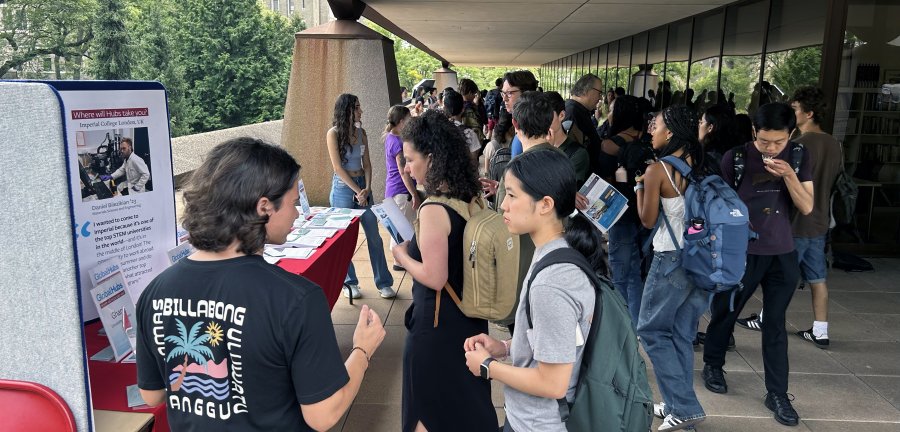Story Circles for Intercultural Understanding
The Office of Global Learning, part of Global Cornell, received a 2021 Belonging at Cornell innovation grant to foster understanding and promote effective, respectful communication among individuals from different backgrounds and across a multicultural society.
Based on UNESCO’s story circles methodology, the project trained workshop leaders to support students as they share their experiences and stories. Leaders facilitated story circles for hundreds of members of the campus community during the project, and continue to host occasional circles by invitation. The initiative was co-led by Brandon Lanners, executive director of the Office of Global Learning, and Gustavo Flores-Macías, associate vice provost for international affairs (2019–23).
Cornell Chronicle: Story Circles Foster Intercultural Conversations, Belonging (April 2022)
Our international students contribute daily to the diversity, excellence, and global engagement of our university. To each of our international students, I want to say directly: You belong here, and we will fight for you to be here. We stand with you and with all of our international faculty, staff and the more than 28,000 international Cornell alumni around the world.
~Cornell President Martha E. Pollack, July 8, 2020
Assessment of Need
Despite the richness of their contributions to the Cornell community, international students face unique challenges in their Cornell experience, the organizers concluded in 2021:
Representing about 24% of the student body (11% of undergraduates, 34% of professional students, and 51% of graduate students), international students are often targets of bias and discrimination because of differences in cultural, linguistic, and social norms. Such barriers—from others' incorrect evaluations of academic merit because of accented English to uneven access to mental health services—can have significant consequences for their sense of belonging, academic achievement, and personal growth.
Federal government policies that sought to restrict international student number, places of origin, and length of stay in the United States exacerbated feelings of exclusion. Anti-globalization, anti-immigrant, and anti-international rhetoric compounds and amplifies other forms of bias against international students related to their race, ethnicity, or sexual orientation.
Not surprisingly, international students increasingly report higher anxiety levels because they do not feel welcome in this country. We believe it is more important than ever to embrace our international student community and support their belonging to Cornell.
Goals and Impact
The Office of Global Learning established the story circles initiative to bridge gaps between Cornell's international and non-international populations. Fostering mutual understanding contributed to international students' sense of belonging at Cornell and their satisfaction and loyalty to Cornell and helped all students to increase their intercultural competence.
Participants identified a number of positive outcomes:
- Highlighting the value that international students' diversity brings to Cornell
- Bringing together groups that might otherwise struggle to find common frames of reference
- Increasing knowledge and awareness of different cultural practices, values, beliefs, and worldviews
- Fostering understanding and effective, respectful communication with individuals from different backgrounds
- Addressing feelings of isolation and alienation among the international community
- Raising awareness that issues of race, ethnicity, and inequality transcend U.S. borders
Methodology
Piloted around the world by UNESCO, story circles1 have proven to be a simple, adaptable, and highly effective methodology to nurture the growing cultural diversity within our societies and develop intercultural competency. Intercultural competency refers to the skills, attitudes, and behaviors needed to improve interactions across differences, whether within a society or across borders. Simply put, story circles involve the sharing of personal experiences within gatherings of three or more people.
Through the technique of storytelling, participants can develop critical elements of intercultural competence, including greater cultural self-awareness, practice listening for understanding, openness, respect for others, reflexivity, empathy, increased awareness of others, relationships with culturally different others, and ultimately greater cultural humility.
1 Based on Darla Deardorff, Executive Director AIEA, Duke University (2020): “UNESCO: Story Circles: Manual for Developing Intercultural Competencies.”
Contact the Office of Global Learning for more information about story circles.


